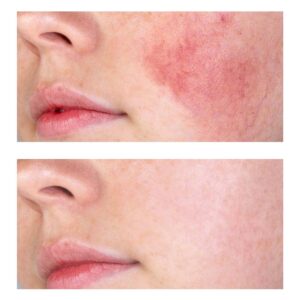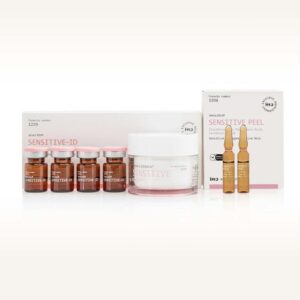Sensitive & Reactive Skin
It is important to control facial redness before it turns into a severe condition.
Sensitive and reactive skin is a multifactorial ailment that causes vascular hyper-reactivity and the weakening of the skin barrier. These skin types overreact to outer and inner stressors, triggering inflammation and irritation too easily, which ultimately leads to an increase in pain sensitivity.
Most common causes
Sensitive skin reacts to most stimuli, whether external, such as weather, or internal.
Internal factors
Stress, hormonal imbalance (menstruation, pregnancy, etc.).
We can classify the signs of sensitive skin as subjective or objective. Nevertheless, as mentioned above, most signs are subjective and not always accompanied by physical manifestations.
External stressors
Cold weather, wind, hot or cold water, the intake of medications, contact with most cosmetic products, soaps, chemical substances, certain fabrics or jewellery, etc.
Visual signs and sensory symptoms
Subjective or sensory symptoms.
Itching.
Burning sensation.
Stinging sensation.
Tightness and dryness.
Objective or visual signs.
Blushing and flushing.
Inflammation.
Eczema.
Hives.
Rashes.
Sensitive skin can affect any body area; however, it is more common on the face, as the skin in this area is thinner and more exposed to environmental stressors.
Natural predisposition
All bodies are different, and so is the skin. Some people’s skin may react faster to stressors simply because their skin is thinner and external stressors penetrate more easily. Additionally, the nervous system also plays a crucial role in skin hyperreactivity. Some people have nerve endings that react more to any stimulus, causing discomfort or triggering inflammation.
Fair-skinned people are generally more affected by this condition, as their skin is slightly thinner than those with dark skin tones.
Disrupted skin barrier function
The skin barrier is the protective film on the top of the skin that impedes the penetration of substances. Therefore, a disrupted skin barrier function facilitates the penetration of irritants and leaves the nerve endings poorly protected, which ultimately leads to skin hyperreactivity and sensitivity.
Stress and Hormones
Indeed, stress makes keratinocytes produce a hormone called cortisol, which promotes inflammation. Furthermore, the fluctuation of oestrogen throughout women’s monthly cycle makes the skin more sensitive and reactive. Hormonal imbalance can down- or up-regulate sebum production, with all the implications it may have on skin health and the integrity of the skin barrier.
Treatment Solutions
We have a professional in-clinic soft chemical peel specific for sensitive skin that promotes the generation and strengthening of the skin barrier, combined with a transdermal solution and at-home medical skincare products that boost the skin barrier function and skin defences, effectively preventing skin hyperreactivity.
Prices
| Per session. | £220 |
Established in 2010
All treatments carried out by a vastly experienced and qualified therapist. Fully licensed and insured.
Latest Technologies
Cutting edge laser and medical aesthetic equipment and medical grade products used for all treatments.
Customer Satisfaction
5 star rated 6 years in a row by our clients on Treatwell. Over 1650 positive reviews.
Flexible Payment
All payment types accepted for treatments.

